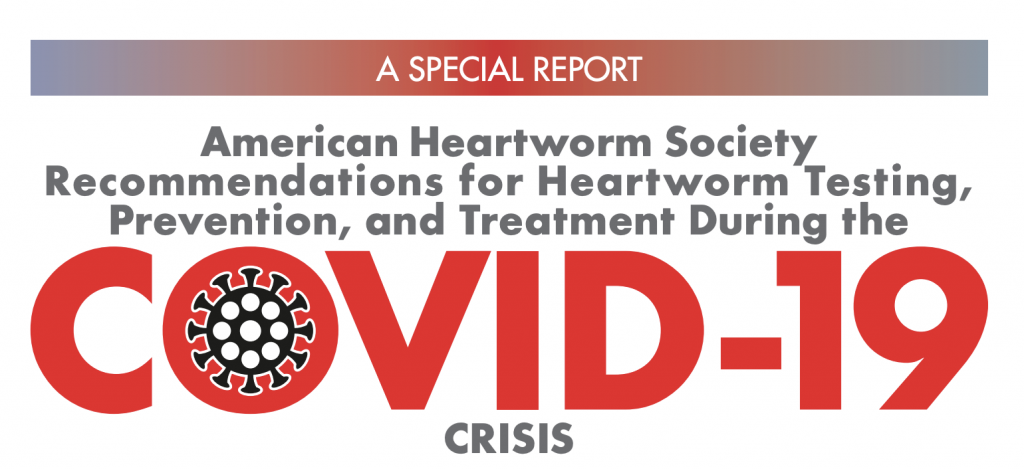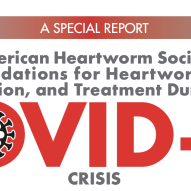American Heartworm Society Recommendations during COVID-19
FOR IMMEDIATE RELEASE
American Heartworm Society provides guidance on heartworm protocols during COVID-19 crisis
WILMINGTON, DELAWARE—The COVID-19 crisis has created unprecedented disruptions in veterinary practices and animal shelters, making it challenging for many professionals to deliver wellness care, as well as certain medical treatments, to patients. As veterinary practices and animal shelters strive to provide the best possible care for their patients, questions frequently arise about heartworm prevention, testing and treatment.
To address these questions, the American Heartworm Society (AHS) has released recommendations to help clinics and shelters deploy optimal strategies for heartworm management in today’s challenging environment.

“The COVID-19 pandemic has made it necessary for veterinarians and shelters to change many day-to-day operations in the interest of limiting virus transmission and protecting public health. This, in turn, has led to questions from veterinarians and shelters about how to adjust their heartworm protocols in the interim. Our recommendations are intended to provide guidance for the unique circumstances veterinarians face today,” stated AHS president Chris Duke, DVM.
According to Dr. Duke, the COVID-19 document will be updated on an as-needed basis in the coming weeks and months and as additional questions arise. You can find the recommendations HERE:
https://d3ft8sckhnqim2.cloudfront.net/ahs-covid-19-recommendations-20200406.pdf?1586197280
Veterinary professionals and others with questions outside the scope of the COVID-19 position paper are encouraged to visit heartwormsociety.org or contact the AHS at info@heartwormsociety.org.
About the American Heartworm Society
The mission of the American Heartworm Society is to lead the veterinary profession and the public in the understanding of heartworm disease. Founded during the Heartworm Symposium of 1974. The American Heartworm Society aims to further scientific progress in the study of heartworm disease, inform the membership of new developments and encourage and help promote effective procedures for the diagnosis, treatment and prevention of heartworm disease.
A note about the COVID-19 crisis and the AHS
The AHS board of directors is comprised of specialists in parasitology, cardiology and community practice, as well as veterinary practitioners in general practice and industry roles. These professionals are dedicated to helping veterinarians and shelters provide the best possible patient care, both during and after the COVID-19 crisis.


We did manage to get our annual blood testing done before the lockdown. I was rushing with it to get ahead of what I saw coming. So we made it.
We have a dog that was adopted from our shelter, but they were misinfirmed about starting HW prevention and haven’t started it. They had oxycycline in June and had their 1st melarsamine injection 1 month ago, but haven’t been giving HW prevention. I started it on prevention today and delayed the 2nd and 3rd injection. How long should I delay it to have the best chance at killing all the heartworms and not having to retreat?
I’m so sorry, but I would check with a cardiologist re this, as I hardly ever treat heartworm here in MN. You can also find great info here:
https://www.heartwormsociety.org/
Best,
Justine
I’m concerned about giving my 52 lb Poodle the Heartgard for dogs 51 – 100lbs. Because of 2 lbs she get double what she’s used to, and I’m think she getting way more than she needs, plus shes getting it every month. Our last 2 pup’s died of unknown cause cancer and I’m wondering if it might not have been because of all these preventive measures and vaccinations that are given over and over again through out the pets life. This pup is 13 months old and will be getting this dose of Heartgard starting Sept. 17…….any advice would be appreciated…ex. could I cut the soft rectangle in 3rds and give her 2/3 dose…..and would it be as effective.
Thank You.
Hi, I totally get it. These products are tested chronically at 5X overdose in studies, and honestly, it’s super safe. My dog is 60 pounds and on the 50-100 dose of this. I’m assuming a standard poodle for 52 pounds – when in doubt, check with your vet. If they think your dog is overweight, you’d be fine with the lower dose, but if your dog is in good body condition, I’d do the 51-100 to be safe. Best, Dr. Justine Lee